Sri Chaitanya Saraswat Institute’s Participation in Interreligious Conference on ‘Newborn Child Care’
13 views
Skip to first unread message
Dr Sumangala Devi Dasi
May 9, 2017, 6:24:02 AM5/9/17
to Online_sa...@googlegroups.com
Sri Chaitanya Saraswat Institute’s Participation in
Interreligious Conference on ‘Newborn Child Care’

Report Prepared By: Sumangala Devi Dasi, Ph.D.
The Bhopal-based NGO ‘Spandan’ in
collaboration with UNICEF organized an one day conference “Interreligious Dialogue
on Newborn Child Care and Immunization’” on May 2, 2017 at Sanchi (Raisen), Madhya Pradesh, India. Dr. Anil
Soumitra from ‘Spandan’, elaborated the objectives and the purpose of this
‘Interreligious Conference’. The main objective of this conference was to explore
how religious wisdom can help us towards a proper newborn child care and thus in
the process of cultivation of well brought-up members for a healthy society. The
program saw slideshow presentations by doctors connected with UNICEF. After
this the opinions of the invited faith leaders were discussed. More than 50 religious
Leaders from different
faith and beliefs like Hindu, Muslim, Sikh, Christian, Buddhist and Jain had participated in
this Interreligious Conference on Newborn Child care.
Sripad Bhakti VijnanMuni Maharaj, Ph.D. and Sripad Bhakti Niskama Shanta Maharaja, Ph.D. from Sri Chaitanya
Saraswat Institute, Bangalore had been invited as Keynote speakers for
providing their important insights on the Newborn Child care from the perspective
of Vedantic wisdom.
Sripad Bhakti Niskama Shanta
Maharaja, Ph.D. emphasized that to teach that Man is simply an enclosed
membrane of chemicals (even though till
date no scientist could produce even a single blade of grass in their
sophisticated laboratories) affects how people think about themselves as
spiritual beings, and thus it influences the way they think about such concerns
as abortion, euthanasia, bioethics in research and medicine, cloning, genetic
modification of food, animal rights and so on. Our attitude is shaped by the
way our education has conditioned us to think about the world. Many young
people have confessed that they became atheists due to the teachings of the
theory of evolution – even those who were formerly theists. This produces a
loss of faith in religion, which comes with a whole tradition of moral teachings.
Thus materialism in science does lead to moral degradation. Moreover, prime focus of our
modern educational system is to acquire basic interpersonal communication and
technical knowledge in their particular field so that they can earn a
livelihood for themselves and live a comfortable life. Dr Shanta said
that the ancient school systems’ main focus was to satisfy
the spiritual quest – athato brahma jijnasa (Vedantasutra1.1.1) and longing for spiritual development, to uplift oneself, without
livelihood based motivations. In such a wholistic education children were trained
(about activities of eternal souls and their eternal relationship with god) from
the very beginning about their spiritual nature and thus they were also properly informed about the real goal of human life, which is much beyond mere immediate
biological needs (mere animal propensity: eating, sleeping, mating and
defending). This is the major difference between modern and ancient educational
systems and the one sided materialistic education in present time has caused a
change in the attitude of parents towards their Newborn Child.
Bonding is the formation of a mutual emotional and
psychological closeness between parents and their newborn child. The psychological
bonding of mother with her child begins before the birth of the child and
understanding of the origin of this psychological bonding is beyond the comprehension
of material concept of life in modern science. The physical dependency of the fetus
with the mother creates a basis for emotional and psychological bonding after
birth. This attachment provides the foundation that allows babies to thrive in
the world. When the umbilical cord is cut at birth, physical attachment to the mother
ceases, and emotional and psychological bonding continues. A firm bond between
mother and child affects all later development, and it influences how well
children will react to new experiences, situations and stresses. In recent time
several parents do not feel that affection and love (for example, professional hiring of surrogate mothers) because they are educated to
uplift their standard of livelihood and not the responsibility towards the
proper upbringing of their children. Dr Shanta highlighted that following
modern education if parents think that their newborn child is a mere enclosed membrane of
chemicals
then how they can develop any bonding with their Newborn Child. Dr Shanta
expressed that his siksha Gurudev Sripad Bhakti Madhava Puri Maharaja, Ph.D. is
very much concerned about the degradation of the modern society due to the
manipulation of people’s mind with materialistic education from a very tender
age. Sripad Bhakti Madhava Puri Maharaja, Ph.D. feels that if the children are
allowed to receive an education on how to lead a God centered life of dedication
(devotion) then our modern society can be saved from all the unwanted problems that
are coming from the material life of exploitation.
American pediatricians John Kennell and Marshall
Klaus did pioneered scientific research on bonding in the 1970s. Working
with infants in a neonatal intensive care unit, they noted that infants were
taken away from their mothers immediately after birth for emergency medical
procedures. These babies remained in the nursery for several weeks before being
allowed to go home with their families. Although the babies did well in the
hospital, a troubling percentage of them seemed not to prosper at home and were
even victims of battering and abuse. Kennell and Klaus also noted
the mothers of these babies were often uncomfortable with them, sometimes not
believing that their babies had survived birth. Even mothers who had
successfully raised previous infants have special difficulties when their
children had been in the intensive care nursery. Kennell and Klaus
surmised the separation immediately after birth interrupted a fundamental
relationship between the mother and the new baby.
Sripad Bhakti Vijnan
Muni Maharaj, Ph.D. pointed out that while one must take the advice of the medical fraternity
very seriously, we must also try to harmonize the religious wisdom of Vedic
concept of childbirth and care to the extent it may be possible. Specially, according
to Srimad Bhagavatam child’s
consciousness develops tremendously from the seventh month. So at that time
spiritual messages, songs, books etc must accompany the mother. Such a process
will make for a child endowed with more spiritual values like faith in God,
compassion, tolerance etc. that are necessary for healthy citizens. The
importance of good association is paramount in the process. The importance of
Garbadhana was also mentioned. Especially, he said "our gurudev Sripad Bhaktisvarupa Damodara
Maharaja, Ph.D., mentioned several times that the soul first enters through the
mind of the father and then comes to the womb of the mother during conception.
Therefore the mind of the parents must be trained for begetting a good child
and that is called garbhadhana samskar." This includes increased chanting of the
holy names of God, serving the devotees and spiritual master. If the parents
are such then there is a good reason for them to beget a child with higher
consciousness. Of course we are not independent in this and depend on the mercy
of God.
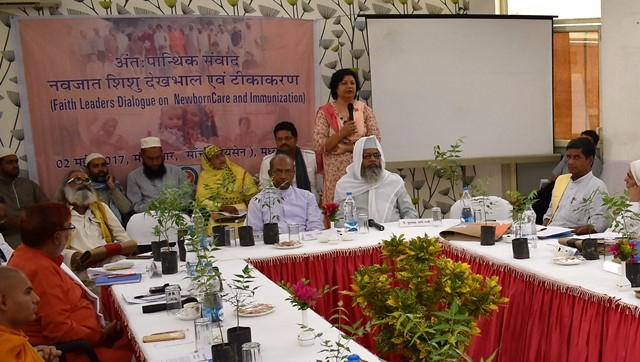
Mrs. Gauri Singh,
Principal Secretary of health department, UNICEF, Bhopal explained the current
situation of Newborn Child care. She said that the facilities and services of
the health department are available but the connection of the community was somewhere
missing. She has agreed with the concerns raised by Dr Shanta and said that the
bonding between mother and child is natural. It is unfortunate that we are
witnessing a situation now where we have to try to help parents develop this
boding mechanically. Because of the influence of modern materialistic education
the parents are running away from their own responsibilities. She said,
everyone should respect and follow the proper teachings of religious leaders and
if they will guide the public regarding this awareness then people will follow
them sincerely.
She also recommended the breastfeeding practices. In a Media report dated
20 May 2016, Dr Francesco Branca, WHO Director of Nutrition for Health
and Development, WHO, said that an estimated 8,20,000
children die every year because they were not breastfed in line with WHO
recommendations that is, fed nothing but breast milk for 6 months, after which
they should continue breastfeeding as well as eating other foods until 2 years
of age. He also said that a child who is not breastfed for his or her first 6
months of life is more than 14 times more likely to die compared to a baby who
gets breast milk only. He concluded that breastfeeding has major benefits for
mothers’ health too, by reducing rates of breast cancer, ovarian cancer, and
type 2 diabetes. Because Colostrum, the yellowish, sticky breast milk
produced at the end of pregnancy, is recommended by WHO as the perfect food for
the newborn, and feeding should be initiated within the first hour after birth.
He said that breastfeeding can also protect a Newborn
Child from diarrhoeal diseases, pneumonia and undernutrition. Overcrowding,
food insecurity, unsafe water, poor sanitation, and overburdened health systems
all contribute to a more dangerous situation for Newborn Child, but if they are
breastfed they can maintain their immunity even in these worsened situation. In
the same report Mr Werner Schultink, Chief of Nutrition, UNICEF, said
that humanitarian organizations must protect, promote, and support breastfeeding
in emergencies.
Mr Manish Mathur, Officer In Charge, UNICEF,
Madhya Pradesh, shared a report on Madhya Pradesh. He said that 1,16,820
children died before they turn to five year of age and 64,063 died within one
month of their birth due to improper care of Newborn child. He also recommended
breastfeeding and immunization for Newborn child. Mr Mital Sanket Shah,
Health Officer UNICEF, Madhya Pradesh, emphasized the importance of Newborn
Child care. Mr Anil Gulati, Communication Specialist UNICEF, Madhya
Pradesh, emphasized the need of a common platform for Religious leaders for the
proper direction of the Society. Dr Sarita Verma and Dr Ashwin
Bhagwat, State health department, presented their views on Newborn Child care
immunization necessity.
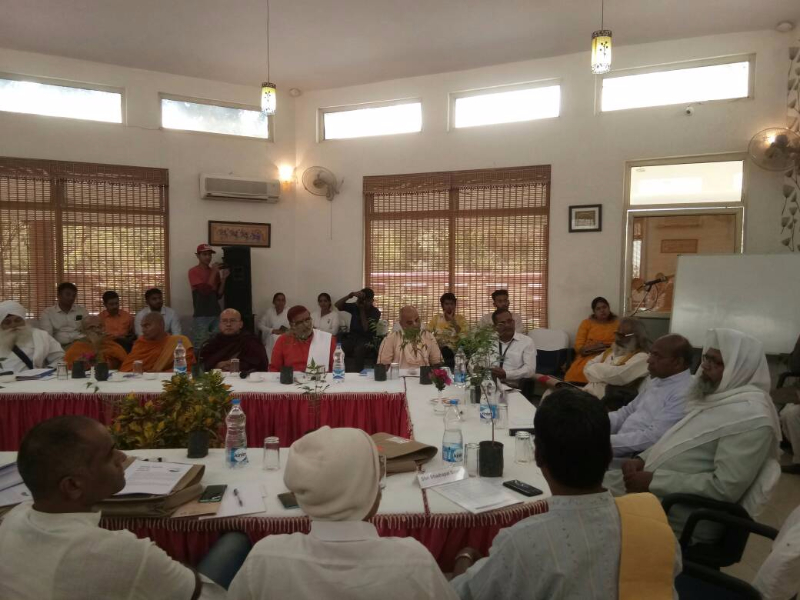
Many more religious leaders also participated
representing different faiths and belief systems: Shri Balbir Das from Chiktrakoot,
Shri Shia leader Syed Azhar Hussain Rizvi, Shri Gyani Harjit Singh, Shahjehababad
Gurudwara, Bhopal, Shri V. Surya, Sanchi University of Buddhist-Indic studies,
Brahmakumari Reena, Mr. MS John of Methodist Church, Shri Vipin Jain, Father
Shaji, Archdiocese of Bhopal, etc. Form the religious point of view, all leaders
from the Hindu, Muslim and Christian faiths agreed that a child cannot be
considered merely as a chemical system. Rather there is a divine principle at
work behind the process of childbirth. The Muslim leader said that as long as even one
child is born in the world, it means according to Koran that the Lord (Allah)
is still caring for mankind and there is hope that mankind can progress towards
higher spiritual destiny. However, they stressed that newborn must be cared for
by mothers very meticulously and regretted that so many mothers do not find
enough time nowadays. The Christian leaders also echoed similar concerns and
said they invite the doctors for doing their work and informing the
requirements to their communities.
Although the doctors
were quite skeptical of the procedures of some of the faith concepts, they were
very much in knowledge that the faith leaders are respected among the common
mass and have a reach that the medical community could well utilize. It must be
pointed out that the Aanganwadi program of the Govt. of India has done a
tremendous work in rural as well as the urban areas to bring technology,
medical fraternity and common man together. There work deserves much
appreciation. The faith leaders also challenged the lack of understanding of
the principles of spiritual conception of childbirth among the doctors and
hence it seems that both sides must work together to see an improvement in
their common goal.
A few more photos from the event:
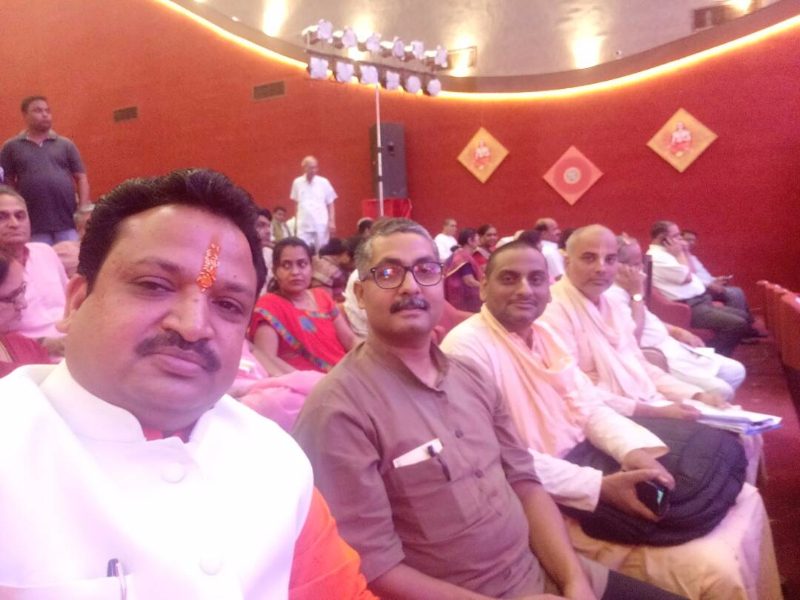
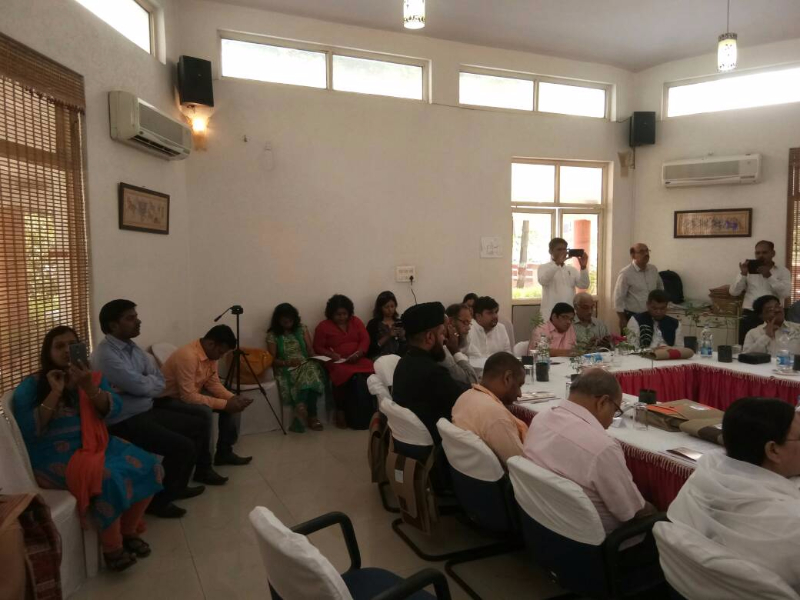
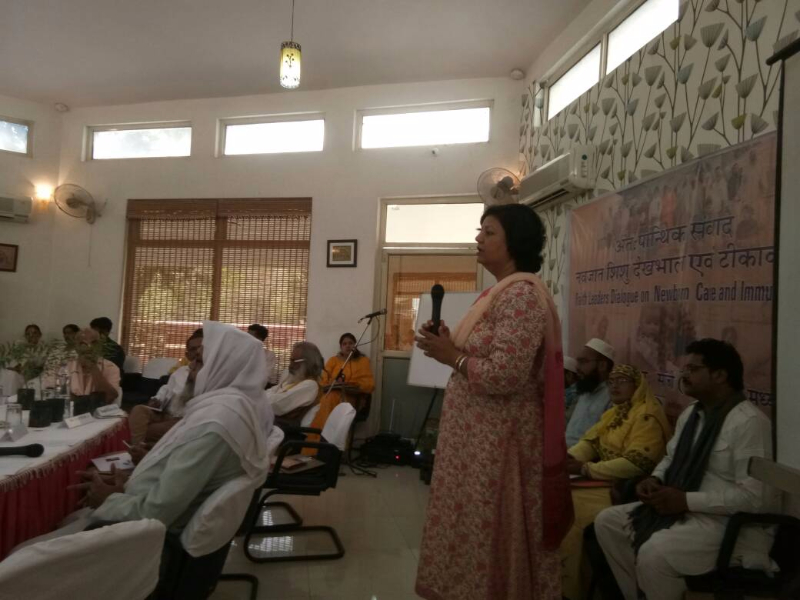
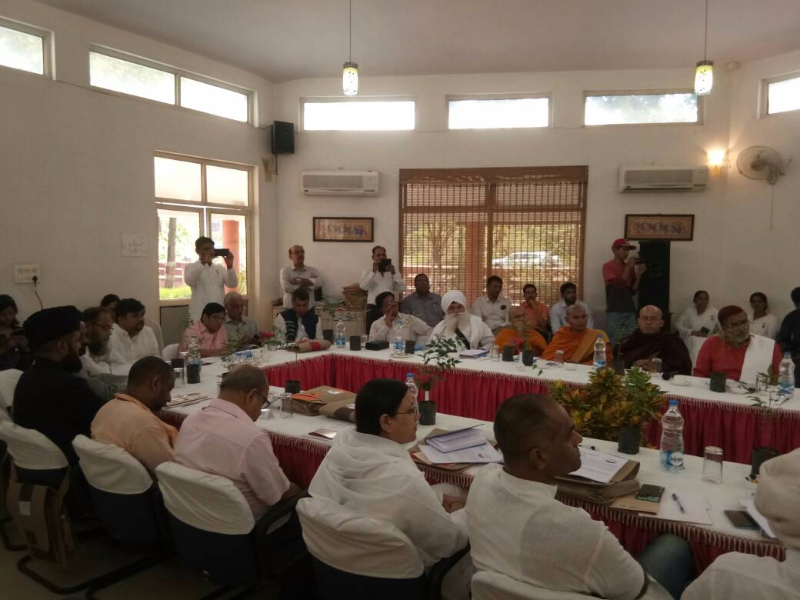
Dr Sumangala Devi Dasi
May 11, 2017, 9:24:10 AM5/11/17
to Online_sa...@googlegroups.com
Dear Sadhusanga group members for your kind information 'Spandan' also published a report on the same. Please visit the link below:
Humbly in service
Sumangala Devi dasi
Reply all
Reply to author
Forward
0 new messages
